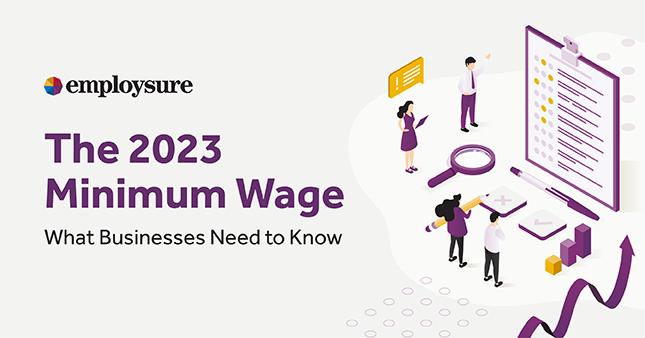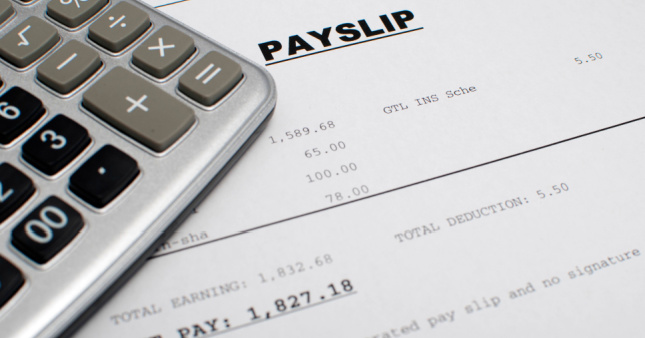
What is the Australian minimum wage?
Currently the National Minimum Wage is $23.23 per hour, or $882.80 per week, for a full-time award free adult employee.

Fair Work Commission Announces 5.75% Increase to the Minimum Wage
The National Minimum Wage increased by 5.75% per cent to $23.23 per hour, for a full-time award free adult employee who is not an apprentice or a trainee. With this increase, a full-time adult employee will receive a minimum of $882.80 per week. These changes came into effect from the first full pay period on or after 1 July 2023.
The modern award minimum wages will also increase by 5.75%. The modern award minimum wage increases will come into effect on 1 July 2023.
The minimum wage increases also affect other payments such as penalty rates, overtime, allowances and more.

Minimum wage definition
What is the minimum wage?
All employees in Australia are entitled to a minimum wage. The minimum wage refers to the amount of pay before tax is taken out (gross pay). An employee’s minimum wage may be set by the National Minimum Wage or the minimum wage set out under their award or agreement. Some employees may also have a different minimum wage, depending on their employment type, age or work capacity, for example apprentices or junior employees.
National minimum wage
The National Minimum Wage is the minimum wage set for employees not under an award or agreement. The minimum wage is the lowest amount you can pay an employee who works for a business that falls under the National Workplace Relations System.
Modern award minimum wage
For employees under an award, minimum wage entitlements are set by the award that covers their industry or occupation. There are a lot of different awards, so it’s important as an employer you ensure you are paying your employees under the correct award.
Under a modern award, an employee may get paid more than the minimum rate for award-free employees. This is based on their classification under an award, and the hours they have worked, and when they worked them.
The minimum wage can also apply to businesses who are covered by a registered agreement based on that award, such as an enterprise agreement, that has been approved by the Fair Work Commission. An enterprise agreement or employment contract may also provide a rate of pay that is higher than the National Minimum Wage or applicable award rate.
State minimum wage
If an employee is not covered by an award or agreement, then the national or state minimum wage applies, depending on if the business is covered by the Fair Work system or the Western Australia State System.
Does the minimum wage increase?
Yes. Each year, a specialist panel within the Fair Work Commission reviews modern award minimum wages and sets the National Minimum Wage for award free employees (which are those employees not covered by an award or an enterprise agreement). Employer groups and unions are allowed to make submissions to the expert panel that determines minimum wages. These submissions are taken into account before the current minimum wage is set.
Does the minimum wage increase apply to all businesses?
The Australian minimum wage increase impacts businesses and employees that fall under the National Workplace Relations System. These are businesses that are covered by the Fair Work Act 2009 (the Fair Work Act). The Fair Work Act covers most private businesses in Australia.
For example, in Western Australia any business that is not a constitutional corporation – if the business is not a proprietary limited company and is a sole trader, for example – is covered by the Western Australian State System. The minimum pay rate for businesses with employees that fall under the Western Australian State System is decided by the Western Australian Industrial Relations Commission (WAIRC).
Call us for free initial advice to help you understand what Workplace Relations System applies to your business.
How does the minimum wage apply to part-time and casual employees?
Part-time employees
Part-time employees have the same minimum entitlements as full-time employees, but on a pro-rata basis, according to the hours they work. This means that a part-time employee is entitled to the same minimum rate of pay per hour as a full-time employee for the job that they do but will generally be paid less overall because they work less than full-time hours.
Casual employees
Casual employees are entitled to a higher rate of pay as they are not entitled to benefits enjoyed by permanent employees, such as paid sick leave and annual leave. Casual workers in Australia are entitled to an additional payment called ‘casual loading.’ Casual loading is made on top of a casual employee’s fixed hourly wage.
The percentile rate of casual loading is determined by the applicable modern award, enterprise agreement or other registered agreement. For award free or agreement-free employees, the rate of casual loading is determined from the National Minimum Wage Order.
To calculate a casual employee pay rate, you must multiply the minimum award rate for the employee’s classification by the percentage of the casual loading rate, as stated in the relevant modern award or other registered agreement.
How much is the minimum wage for part-time and casual employees?
Part-time employees
Part-time employees have the same minimum entitlements as full-time employees, but on a pro-rata basis according to the hours they work. This means that a part-time employee is entitled to the same applicable minimum wage per hour as a full-time employee, although they will generally be paid less overall because they work less than full-time hours.
Casual employees
Casual employees are entitled to a higher rate of pay as they are not entitled to benefits enjoyed by permanent employees, such as paid sick and annual leave.
Casual workers in Australia are entitled to an additional payment made on top of a casual employee’s fixed hourly wage. This payment is called ‘casual loading’. The percentile rate of casual loading is determined by the applicable Modern Award, Enterprise Agreement or other registered agreement. For award-free or agreement-free employees, the rate of casual loading derives from the National Minimum Wage Order.
To calculate a casual pay rate, you must multiply the minimum award rate for the employee’s classification by the percentage of the casual loading rate, as stated in the relevant Modern Award or other registered agreement.
Does the minimum wage apply to junior employees?
This will depend on the award or agreement the business falls under. Awards and agreements may stipulate a percentage of the adult wage for anyone who is defined as a junior employee. If a business is deemed to be award free under both the Fair Work system and the Western Australian State legislation, generally junior rates will apply until the age of 20.
The rates tend to increase in increments and as such the rate for a 16-year-old will differ from that of a 17-year-old. The percentage is calculated according to the employee’s age, and it increases every year on their birthday. Once the employee reaches 21 in this circumstance, the full adult minimum wage will apply.
Does the minimum wage apply to apprentices?
Yes. Apprentices are entitled to a minimum rate of pay which will primarily depend on what apprenticeship they are completing and what modern award they fall under. An apprentice’s minimum rate of pay is affected by:
level of schooling they have completed
how long ago they left school
what stage of the apprenticeship they are at
A mature age apprentice refers to an adult apprentice, who is 21 years of age or older. An adult apprentice gets a higher minimum pay rate than a junior apprentice. They may possibly require an even higher rate of pay if they have worked in the business prior to starting their apprenticeship.
When does the minimum wage increase?
The National Minimum Wage increased by 5.75% to $23.23 per hour, for a full-time award free adult employee who is not an apprentice or a trainee. These changes come into effect from the first full pay period on or after 1 July 2023.
The modern award minimum wages also increased by 5.75%. The modern award minimum wage increases will come into effect on 1 July 2023.
The minimum wage can be confusing, and it’s not a ‘one size fits all’. As an employer, you need to stay up to date with the ages of your staff, their circumstances and any award changes, to ensure you pay all your staff correctly.
Frequently Asked Questions
Does an employer have to pay the minimum wage?
Yes. The minimum wage is the minimum that an employee must be paid. This may be outlined in an award, agreement or as set by the Commission under the National Minimum Wage.
Can an employer pay above the minimum wage?
Yes. As an employer you may choose to pay an employee above the minimum wage as outlined by the Commission, award or agreement. However, you will need to watch out for increases to the minimum wage rates to ensure you are paying on or above the minimum wage. If your business is not keeping pace with the relevant pay increases, you could risk underpaying your staff.
How do I pay employees not covered under a modern award?
If an employee is not covered by an award or agreement, then the National Minimum Wage or state minimum wage applies (depending on if the business is covered by the Fair Work system or the Western Australian State System).
Do different states have different minimum wages?
Most states fall under the Fair Work Act 2009, so the current national minimum wage applies. However, in Western Australia if the business is a non-constitutional corporation, the Western Australian State System will apply.
While all employment in Victoria, ACT and the NT is covered by the national system, please note the above information does not include all state or local government employees. For example, if you are a private entity performing contract work for a state or local government, you would be covered by the national system. For all other states, refer to the modern awards or enterprise agreement your employees are under, or contact Employsure, for more information.
What is the minimum wage in Australia after tax?
This will depend on the employee’s personal circumstances and their tax liability, as determined by the Australian Tax Office (ATO). Unfortunately, Employsure is unable to give financial advice.
Does the minimum wage change based on industry?
The National Minimum Wage or state minimum wage will not change based on industry. However, because minimum wages are also captured in awards and agreements, and these awards and agreements are often aligned to an industry or occupation, minimum wage may be impacted by industry in these cases.
What is the difference between a salary and a wage?
A wage is a rate of pay commonly affixed to a period of time such as per hour, or per day. A salary is a fixed regular payment agreed upon in an employment contract, however it is not affixed to the number of hours performed.
Is there a minimum salary in Australia?
The minimum salary in Australia depends on the job the employee does and the hours that they work. A salary is a fixed, regular payment agreed upon in an employment contract, generally for a certain amount of hours worked per week, usually expressed over the course of year (e.g. $60,000 per annum).
A salaried employee is required to receive all the same entitlements as a wage worker under the National Employment Standards or relevant modern award and be paid at least the minimum wage for the job that they do and the hours they work.










